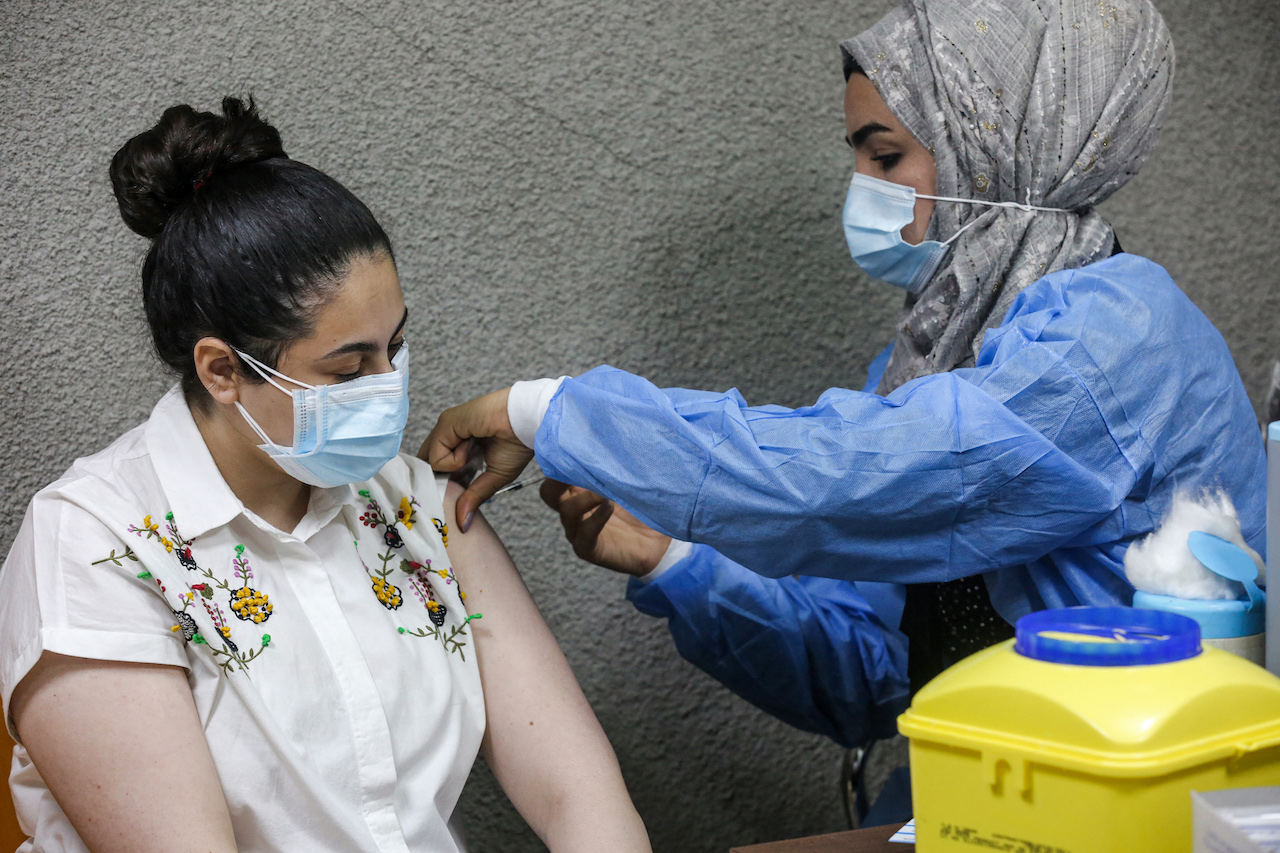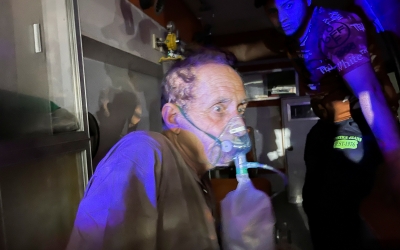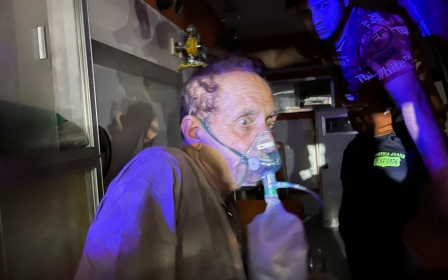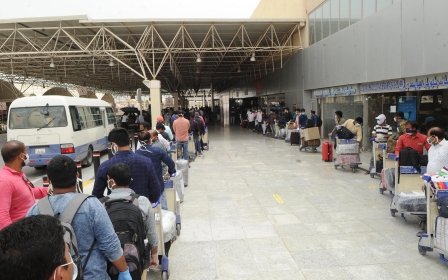Covid-19: Iraq's doctors struggle against vaccine fears as cases hit new highs
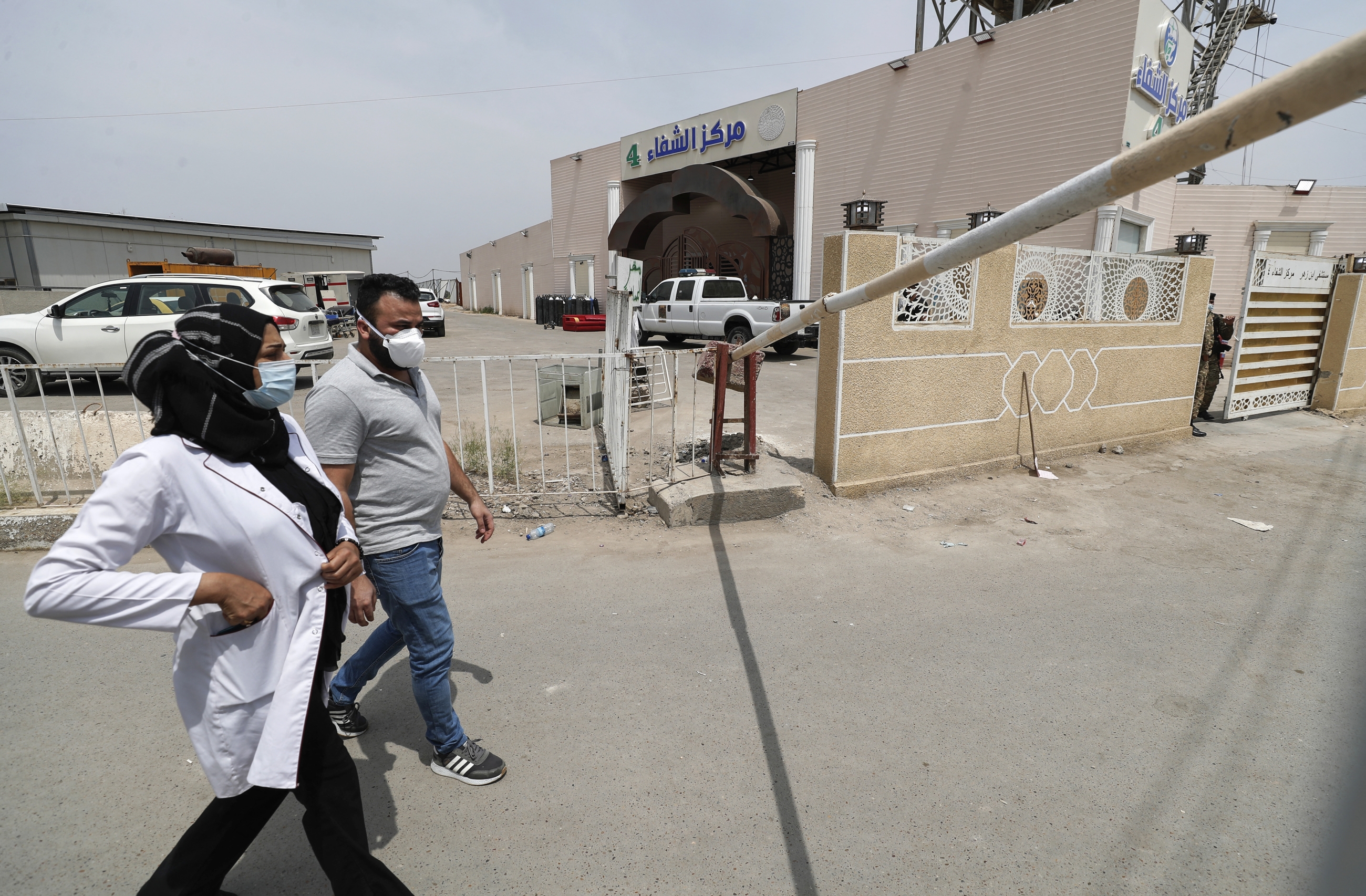
Iraq's vaccination programme is failing to keep up with a coronavirus spike that has sent the number of recorded Covid-19 cases in the country to the highest level in the Arab world.
Doctors are becoming increasingly exasperated as crumbling infrastructure, government inaction and the spread of "fake news" over the safety of vaccines are undermining attempts to halt the spread of the disease.
The latest health ministry statistics register more than a million infections in the country, as well as at least 15,465 deaths. Health experts have warned, however, that the numbers could potentially be higher as many Iraqis delay coming forward when they suspect they have contracted the illness.
A doctor who works at the Rusafa Directorate of Health in Baghdad told Middle East Eye that Iraq was still in the "red zone" with regards to Covid-19 cases.
'People try to believe the rumours that are present in our streets, and that's made the controlling this virus very difficult right now'
- Baghdad doctor
"We just vaccinated 10,000 people per day and according to those numbers we'd need years to reach herd immunity by vaccination, and that's a very bad thing, especially now with mutations," he said.
The doctor spoke on condition of anonymity, as the Iraqi Ministry of Health last year issued a blanket ban on health workers talking to media.
Iraq began vaccinating last month, first receiving 50,000 doses of the Sinopharm vaccine (primarily for health workers) and then a 336,000 doses of the AstraZeneca jab through a World Health Organisation (WHO)-backed initiative. So far, however, just over 100,000 people out of Iraq's 40 million population have been vaccinated.
Fears over the safety of the vaccines that first originated in Europe have migrated to Iraq.
In March, a number of European countries suspended the use of the UK-manufactured AstraZeneca vaccine after reports of blood clots causing a number of deaths. Though the European Medicines Agency (EMA) later ruled that the risks were minimal, the controversy stoked anxieties internationally that there were health risks associated with vaccination.
"We have people who refuse the vaccine, mostly who refuse the Chinese Sinopharm vaccine and refuse AstraZeneca due to some European agencies saying that it can cause a mortality rate or something like that," said the Baghdad doctor.
"We try to say this is fake news, and that if we have one million vaccinated people maybe four or five would die and there is no direct relationship between the death and the vaccine. But the people don't believe that. People try to believe the rumours that are present in our streets, and that's made controlling this virus very difficult right now."
The spiking numbers also come in the wake of a devastating blast at a major hospital in Baghdad caused by exploding oxygen cylinders, resulting in scores of deaths.
The explosion at the city's Ibn al-Khatib hospital last Saturday has so far claimed at least 130 lives, according to the semi-governmental Iraqi High Commission for Human Rights.
The Baghdad doctor said it was a further indication of the country's failure to implement fire-safety measures and enforce regulations.
"The oxygen is stored inside the wards, and at the same time the people are smoking and cooking food inside these wards," he said, with families unwilling to allow their infected relatives to be isolated within the wards.
"In Iraq, every building is neglecting industrial safety and work safety and occupational safety, in all places."
He warned that with no improvement across the board, and with the number of intensive care beds shrinking, the country was at risk of "medical collapse in a few months".
Changing perceptions
Like a number of countries, mainly in the Global South, Iraq was unable to negotiate early access to the Covid-19 vaccines and the delay has been costly.
Ahmed Zouiten, the WHO representative in Iraq, told MEE that Iraq would be receiving a shipment of 500,000 doses of the AstraZenica vaccine shortly.
"UNICEF, who is our agent for the transport, will receive it in Europe today and will be transporting it in the upcoming days to Iraq," he said.
The shipment is the second part of a vaccine shipment procured through the WHO-supported Covax programme, which eventually aims to deliver 1.7 million doses to Iraq.
He said there had initially been a good uptake for the original 336,000 doses of the vaccine, with around 10,000 or 12,000 vaccinations being carried out every day.
However, the controversy that emerged around AstraZeneca in Europe brought the programme to a halt.
"The countries do not usually think about the effect of such kind of politics in public health when they stop it in their countries," he said.
'In Iraq everyone said 'no, it's not safe, we don't want to be vaccinated,' so the vaccination rate dropped and the vaccine uptake started to go really, really down'
- Ahmed Zouiten, WHO representative in Iraq
"In Iraq everyone said 'no, it's not safe, we don't want to be vaccinated,' so the vaccination rate dropped and the vaccine uptake started to go really, really down."
Despite attempts by the WHO to promote the safeness of the vaccines, the country is still struggling to increase the uptake again, a situation made worse by irresponsible media and longstanding suspicion of both the state and the competency of the health authorities.
"This has given the idea that the [health] management is not up to standard, which is not true," said Zouiten.
"We've trained doctors and nurses, we've purchased so much material, respirators, oxygen cylinders, you would not believe how much was invested to increase the ICU [intensive care unit] capacity in the country. Yet people stay on that idea that the health system will not be adequate to respond to their needs."
The support of public figures in promoting the safety of the vaccines has, thus, been seen as crucial.
In a move that Zouiten described as "very historical" in potentially changing perceptions, the influential Shia cleric Muqtada al-Sadr publicly called on all Iraqis to accept vaccination and released a video of himself being vaccinated on Thursday evening:
Sadr had previously been a major sceptic of the pandemic and had repeatedly called for mass gatherings by his followers, citing the power of prayer to curb the pandemic.
He has since reversed his earlier scepticism, something that was sardonically noted by some Iraqi social media users.
"I took the vaccine for the people, so don't let me down," Sadr said on Thursday, according to Nas News.
"Come and get the vaccine. You will do well."
On Friday, Ghayeb al-Amiri, a member of the Parliamentary Health Committee and a Sadr-supporting Sairoun Alliance MP, said the number of people registering online for vaccination had increased.
According to Nas News, Amiri wrote in a blog post that "more than 610,000 applicants submitted to the vaccine electronic platform" within the space of half an hour.
'Rebuild the health system'
Since the pandemic first struck Iraq in February 2020, there have been repeated warnings from health experts and doctors that the country's healthcare system would be stretched to the limit.
Battered by decades of wars and sanctions, the once-lauded Iraqi health system has long been on the verge of crumbling, despite the best efforts of officials and health workers.
Controversy is still raging over the Ibn al-Khatib hospital blast, with arrest warrants issued for employees at the hospital and the suspension of the country's health minister.
Ultimately, the Baghdad doctor said, the whole edifice of Iraq's health system would need to be rebuilt from scratch, a process that, unfortunately, wouldn't be viable any time soon.
"You need to rebuild the health system from new again, and this rebuilding needs new resources, needs a lot of money," the doctor said.
He added that doctors also needed "improved data, day work hours, improvement for their salaries, improvement in their education and other kinds of improvement".
"Because a lot of doctors now are thinking about immigration outside Iraq."
Middle East Eye propose une couverture et une analyse indépendantes et incomparables du Moyen-Orient, de l’Afrique du Nord et d’autres régions du monde. Pour en savoir plus sur la reprise de ce contenu et les frais qui s’appliquent, veuillez remplir ce formulaire [en anglais]. Pour en savoir plus sur MEE, cliquez ici [en anglais].


